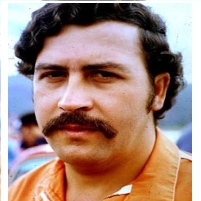Judge Orders CIA to Turn over More Documents about Drug Kingpin Pablo Escobar
Monday, August 20, 2012
 Pablo Escobar
Pablo Escobar
Although it might seem obvious, when searching for records related to Colombian drug kingpin Pablo Escobar, the Central Intelligence Agency must actually search for the name “Pablo Escobar,” and must search everywhere they might reasonably be found, according to a federal judge in Washington, DC. Escobar (Dec. 1, 1949–Dec. 2, 1993) founded the Medellín drug cartel, which in the 1980s controlled 80% of the global cocaine market, shipping 15 tons a day, worth more than $500 million, to eager consumers in the U.S. In 1989, Escobar made Forbes magazine’s list of the world’s richest people, with a net worth estimated at $3 billion.
Despite all that notoriety, the Washington-based think tank Institute for Policy Studies (IPS) has been fighting the CIA since 2004 to force the agency to turn over documents that may reveal its links to a vigilante group in Bogotá that helped track down Escobar. That group was PEPES (People Persecuted by Pablo Escobar), which was created by rival drug smugglers and illegal right-wing militias and maintained regular relations with the Colombian police and U.S. drug agents. PEPES harassed, tortured and killed Escobar’s relatives, associates and lawyers until police shot Escobar in 1993.
After PEPES disbanded, many of its members went on to found the illegal paramilitary group United Self-Defense Forces of Colombia (AUC), which has killed thousands of civilians suspected of supporting leftist guerrillas. Many AUC leaders are now under U.S. indictment for drug-trafficking, which IPS researcher Paul Paz y Mino calls blowback from short-sighted U.S. decisions in the hunt for Escobar. “The kind of monster the U.S. helped create was, in many ways, worse than what they wanted to destroy,” he said about the PEPES transforming into the AUC. The AUC has been designated a terrorist organization by many countries and organizations, including the U.S. and the European Union.
Curious about ties between the CIA and PEPES, IPS sued the CIA in 2006 for making a legally inadequate response to an IPS FOIA request filed in 2004. IPS complained that the CIA improperly redacted the documents it turned over and failed to perform a complete search for records on Escobar and PEPES.
U.S. District Judge Royce Lamberth ruled that the CIA’s redactions were justified, but that the CIA “failed to perform an adequate search by failing to search three of their five directorates as well as failing to search for plaintiff's requested term ‘Pablo Escobar.’” CIA officials admitted that in conducting their search, they did not even look through records at three of its directorates, of which there are five: Directorate of Intelligence (DI); National Clandestine Service (NCS); Directorate of Science and Technology (DS&T); Directorate of Support (DS); and Director of CIA Area (DCIA). The CIA argued that it did not search DS&T, NCS, or DC for responsive records “because the files most likely to have information responsive to the request would be exempt” under the FOIA statute.
Judge Lamberth ruled that the Freedom of Inforamation Act requires the CIA, or any agency, to “made a good faith effort to conduct a search for the requested records,” and that the CIA’s “failure to search the remaining three directorates while admitting that they would likely contain records responsive to plaintiff’s search does not rise to the level of an adequate search,” noting that the agency would have the opportunity to claim that certain records were exempt from disclosure.
He also ruled that searching only for “Escobar” and not for “Pablo Escobar” was inadequate, rejecting the CIA’s claim that even admitting the existing of records containing the name “Pablo Escobar” could harm national security, as Escobar has been dead for nearly 20 years.
- Matt Bewig
To Learn More:
CIA Must Extend Search for Pablo Escobar Docs (by Ryan Abbott, Courthouse News Service)
Institute for Policy Studies v. CIA (U.S. District Court, D.C., 2012) (pdf)
Lawsuit s\Seeks to Unearth CIA Ties to Paramilitaries (by Steven Dudley, Seattle Times)
- Top Stories
- Unusual News
- Where is the Money Going?
- Controversies
- U.S. and the World
- Appointments and Resignations
- Latest News
- Trump to Stop Deportations If…
- Trump Denounces World Series
- What If China Invaded the United States?
- Donald Trump Has a Mental Health Problem and It Has a Name
- Trump Goes on Renaming Frenzy






Comments